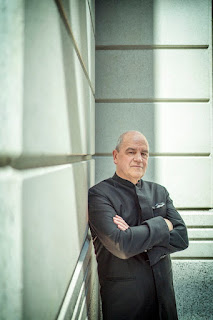ISO: Choral masterpieces pose effective contrast of spiritual and secular values
The perpetual seesaw of sacred and profane, which rocks this weekend's Classical Series concerts of the Indianapolis Symphony Orchestra, makes for special excitement.
Igor Stravinsky's "Symphony of Psalms," not performed by the ISO since 1982, occupies the program's first half with its spiky, austere reverence. Recoiling from the lavish writing for orchestra that brought him fame before World War I, the Russian composer moved into a restrained style that also eschewed Romantic expressiveness. As the ISO program note points out, he was even explicit about music's inability to express anything but itself.
Yet "Symphony of Psalms" is quite moving especially in the third section, where the music certainly
seems to have lots to say about the texts. In these performances, those are projected overhead so the audience can easily follow along throughout both works on the program.
 |
| Austrian conductor Hans Graf |
seems to have lots to say about the texts. In these performances, those are projected overhead so the audience can easily follow along throughout both works on the program.
Carl Orff's "Carmina Burana," a perpetual people's choice among 20th-century choral works, takes up the bulk of the program. The long-suppressed texts draw on the anonymous poetry of peripatetic medieval clerics and students, entertaining profane thoughts on the sly. The music is fully engaged with the pleasures and woes of this worldly life, all under the fickle hand of Fortune, the force apostrophized to open and complete the work.
The Indianapolis Symphonic Choir, prepared by its longtime director Eric Stark, makes a welcome return to the series in both works, with the Orff work also bringing into play three guest vocal soloists and the Indianapolis Children's Choir. Hans Graf, a frequent podium guest at Hilbert Circle Theatre, conducts.
Graf spoke to the Words on Music session preceding Friday's performance of Orff's admiration for "Symphony of Psalms." The German composer, who maintained affection for the theatrical side of music performance even while he settled into accommodation to the Nazi regime, never rejected the opportunity to move people. More likely, Orff drew inspiration from "The Wedding," a peculiar ballet-cantata that took Stravinsky a long time to get in final form, completing it in 1923 as he firmed up his thirty-year sojourn in neoclassicism. The influence of "Symphony of Psalms," extended closer to our own time, is especially evident in Leonard Bernstein's "Mass" and "Chichester Psalms."
Clarity of rhythm and sonority distinguish both works on the ISO program, and the orchestra is set up this weekend to adapt to the unusual scoring, with the sentimental influence of strings reduced and the vigorous articulation of winds and percussion brought forward.
In "Carmina Burana," placement of the vocal soloists reflected Orff's theatrical bent. Briefly used to spotlight the lament of a roasted swan, the countertenor Aryeh Nussbaum Cohen was somewhat costumed with a flourish suggesting both flames and the bird's wonted elegance. He appeared and then receded high on the male side of the choir. His singing outlined the grotesque comedy of the swan's fate without hamming it up.
Soprano Ashley Fabian, clad in a red, off-the-shoulders gown, sings her more extensive solos on carnal love off to the other side, perched near the children's choir. The kids' music frankly suggests that theme on the emergence from puberty, perhaps risky in our oversensitive age. But nature cannot be denied.
Both guest singers caught their characters' significance aptly, but they were
exceeded in vitality and expressiveness by the third one: Hyung Yun, a baritone in formal wear positioned near the front of the stage to the conductor's right.
 |
| Hyung Yun, Korean baritone |
exceeded in vitality and expressiveness by the third one: Hyung Yun, a baritone in formal wear positioned near the front of the stage to the conductor's right.
The baritone solos represent the anguish that recurs through the poems concerning unrequited love and other barriers to happiness under the rule of Fortune. This soloist was mesmerizing in every phrase, and both his soaring falsetto and the near-growl sometimes required couldn't have been more expertly managed. A colorless singer undertaking this role would sap "Carmina Burana" of much of the vigor that choral forces can't be expected to supply on their own, excellent though they are here. Hyung Yun was leagues away from dullness or routine, on the brilliant side of the spectrum.
These concerts afforded ISO patrons the opportunity to reflect on the inevitable polarity between the purity of spiritual transcendence and the rootedness we all share in earthly life, with its temptations and fleeting joys, and its encouragement to weigh temperance and morality against desire and perhaps choose the latter. And as addressed through this music, audiences become acquainted a little better with how composers of the recent past set aside the 19th-century heritage that still dominates classical programming to produce masterpieces of a different and distinguished kind.



Comments
Post a Comment